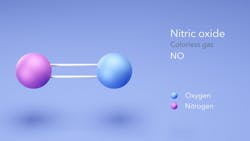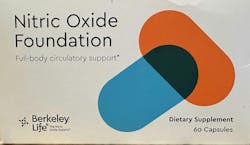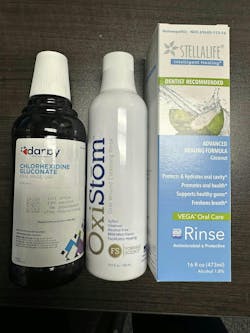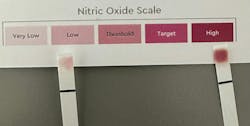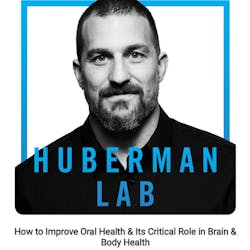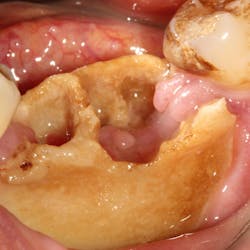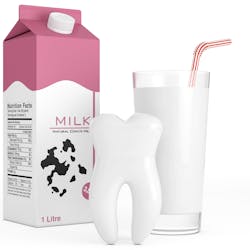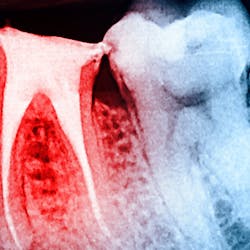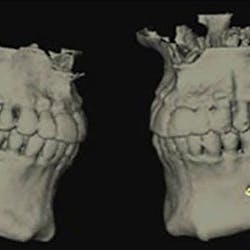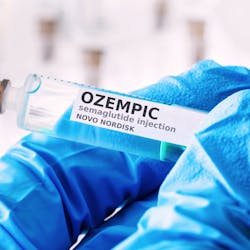Nitric oxide (NO) is a gas formed by combining nitrogen and oxygen that acts as an important chemical messenger involved in many bodily functions. NO plays a role in neurotransmission, digestion, cognitive function, and immunity, and it can stimulate the release of growth hormone and insulin.1 NO is extremely important in cardiovascular function as it is a potent vasodilator, improves oxygen flow, decreases peripheral artery disease, decreases blood pressure, and reduces angina.
Several studies have suggested that patients who consistently use antiseptic mouth rinses have been shown to have elevated blood pressure.2 Other studies have shown that although blood pressure increase induced by antiseptic mouthwash use was small (2.3 mm Hg), it was still statistically significant.3
This article will briefly explain why nitric oxide is affected by mouth rinse use as well as discuss a study that demonstrated one mouth rinse has the potential to not affect nitric oxide production in the mouth.
How is nitric oxide made?
Nitric oxide production occurs via three main pathways:
- Nitric oxide synthase pathway (NOS): Enzymatic (NOS enzymes include eNOS, nNos, iNos) production of nitric oxide from the amino acid L-arginine, oxygen, and NADPH to make L-citrulline with the byproduct of nitric oxide.
- Nitrite-nitric oxide pathway: Dietary sources such as beets, celery, arugula, and spinach are used to make nitrite and converted to nitric oxide during hypoxic conditions.
- Enterosalivary pathway: Foods high in nitrates are converted and concentrated (about tenfold) to nitrite in the saliva by commensal aerobic bacteria (e., Neisseria, Haemophilus, Veillonella, Prevotella, Actinomyces) found on the posterior dorsum of the tongue. This saliva is swallowed, and when it enters the stomach with the right pH (1-3), it is further reduced to nitric oxide and absorbed into bloodstream via the small intestine.
Why does mouth rinse decrease nitric oxide and increase blood pressure?
Because antiseptic mouthwashes eradicate the oral bacterial flora, the enterosalivary nitrate–nitrite–NO pathway is abolished, which may result in nitric oxide-deficient conditions that potentially lead to high blood pressure.
One study reported significantly higher systolic blood pressures following use of chlorhexidine 0.12% and cetylpyridinium 0.05% mouthwash solutions compared with controls. However, every mouthwash with antiseptic properties against nitrate-reducing oral bacteria should be capable of decreasing the NO bioavailability and provoking adverse events.4
Is there a mouth rinse that does not affect nitric oxide in the mouth?
A recent study evaluated 10 patients who were given dietary nitrate supplements (figure 1) to boost NO production and were exposed to three different mouth rinses. Subjects were instructed to rinse for 60 seconds with either 0.12% chlorhexidine gluconate, OxiStom (active ingredient 1.5% hydrogen peroxide), or StellaLife coconut mouth rinse (figure 2).
The patients were then tested with a patented Nitric Oxide Test strip from Berkeley Life, which is designed to assess the body’s conversion of dietary nitrates into NO (figure 3). Both 0.12% chlorhexidine gluconate and OxiStom showed a decrease in NO potential after rinsing, while StellaLife had no effect on the test strip color and presumably NO concentration (figure 4).
This proof-of-concept study needs to be replicated as well as subjected to a randomized controlled trial. That being said, this may prove to be a first step toward showcasing the ability of one mouth rinse to decrease pathogenic bacteria while avoiding removal of the eubacteria involved in NO production.5
Editor’s note: This article originally appeared in Perio-Implant Advisory, a chairside resource for dentists and hygienists that focuses on periodontal- and implant-related issues. Read more articles and subscribe to the newsletter.
References
- Kiani AK, Bonetti G, Medori MC, et al. Dietary supplements for improving nitric-oxide synthesis. J Prev Med Hyg. 2022;63(2 Suppl 3):E239-E245. doi:10.15167/2421-4248/jpmh2022.63.2S3.276
- Sundqvist ML, Lundberg JO, Weitzberg E. Effects of antiseptic mouthwash on resting metabolic rate: a randomized, double-blind, crossover study. Nitric Oxide. 2016;61:38-44. doi:10.1016/j.niox.2016.10.003
- Bondonno CP, Liu AH, Croft KD, et al. Antibacterial mouthwash blunts oral nitrate reduction and increases blood pressure in treated hypertensive men and women. Am J Hypertens. 2015;28(5):572-575. doi:10.1093/ajh/hpu192
- Woessner M, Smoliga JM, Tarzia B, Stabler T, Van Bruggen M, Allen JD. A stepwise reduction in plasma and salivary nitrite with increasing strengths of mouthwash following a dietary nitrate load. Nitric Oxide. 2016;54:1-7. doi:10.1016/j.niox.2016.01.002
- Tsai YWC, Siddiqui DA, Kotsakis GA. Selective antimicrobial effects of an herbal compound rinse against multi-species oral biofilms. December 29, 2023, PREPRINT (Version 1) available at Research Square. https://doi.org/10.21203/rs.3.rs-3775080/v1
Scott Froum, DDS, a graduate of the State University of New York, Stony Brook School of Dental Medicine, is a periodontist in private practice at 1110 2nd Avenue, Suite 305, New York City, New York. He is the editorial director of Perio-Implant Advisory and serves on the editorial advisory board of Dental Economics. Dr. Froum, a diplomate of both the American Academy of Periodontology and the American Academy of Osseointegration, is a volunteer professor in the postgraduate periodontal program at SUNY Stony Brook School of Dental Medicine. He is a PhD candidate in the field of functional and integrative nutrition. Contact him through his website at drscottfroum.com or (212) 751-8530.
